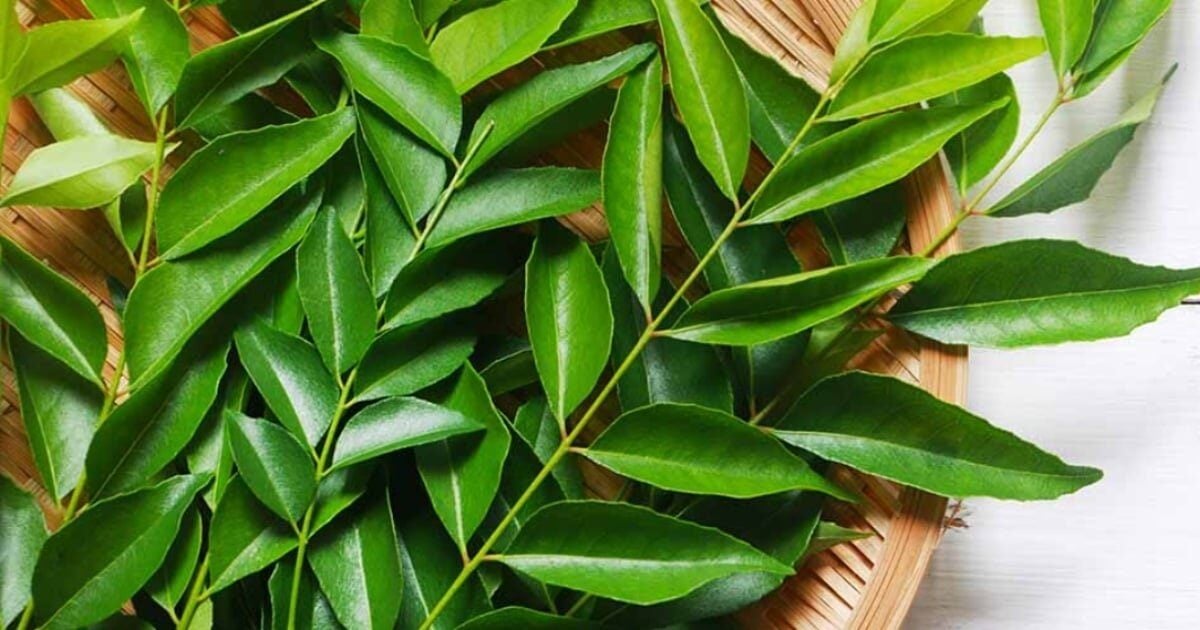What are Curry Leaves?
Curry leaves are aromatic herbs that are native to India and widely used in South Asian Cuisine. These are small green leaves that are shiny and are known for their distinctive flavor and fragrance. Scientifically known as Murraya Koenigii, they are a staple ingredient in South Indian cooking and are often added to dishes like curries, dal, chutney, and rice preparation to enhance flavor.
Beyond their culinary uses, curry leaves are packed with nutrients like vitamins A, B, and C, iron, calcium, and fiber, with some antioxidants and minerals like phosphorus, magnesium, and zinc. [4]
These vibrant green leaves may be small, but they are loaded with high nutrient contents and health-promoting compounds that have earned them the title of a “Super leaf”. They offer a unique combination of taste and wellness. From aiding digestion to supporting blood sugar control, their benefits are backed by both tradition and modern research.
Come, let’s explore the different types of curry leaves, curry leaves vs other spices, Ways to Utilize Curry Leaves as a Spice Substitute, health benefits, ways to consume, and some of the nutritional values of this amazing super leaf - curry leaves.

Different Types of Curry Leaves
-
Regular- The most common type used in cooking.
-
Ceylon Gamthi- A Rare variety with larger, aromatic leaves.
-
Suhasini- Known for its strong flavor and aroma—flowers multiple times a year.
-
Andra variety- A rare type with distinctive aroma and flavor.
-
Dwarf - A bushy variety ideal to grow in smaller places, has a strong flavor, and has a higher yield.

Curry Leaves vs Other Spices
The healthier choice for health and wellness, unlike traditional spices such as chili powder, garam masala, onion powder, and other store-packed seasonings that contain preservatives, artificial flavoring, or high sodium content.
Instead of those spices, blending curry leaves contributes to both taste and better health benefits, avoiding artificial additives and excessive sodium. They are rich in flavonoids, phenolic compounds, and alkaloids that help combat oxidative stress and prevent cellular damage.[1]
Ways To Utilize Curry Leaves As A Spice Substitute
-
Seasoning: Use fresh or dried curry leaves in place of chili powder or mixed spice blends for a unique, aromatic flavor.
-
Tea: Use as a tea for better digestion.
-
Garnishing: Sprinkle crushed curry leaves over dishes instead of store-bought seasoning.
-
In the main course: Add curry leaves to soups, curries, and rice dishes.[2]
Health Benefits of Curry Leaves
Improves Digestion
Leaves aid digestion by stimulating digestive enzymes, reducing indigestion, and supporting gastrointestinal health. They also help alleviate issues like constipation and diarrhea. Consuming them on an empty stomach can help regulate bowel movements, reduce constipation, and improve overall digestive health.
The fiber content also helps in cleaning the digestive tract and also helps prevent digestive disorders. As enhanced digestion leads to a better metabolism, it makes it easier for our body to convert food into energy efficiently.[3].
Supports Heart Health
Supports Heart Health: Consuming curry leaves can have a positive impact on our cardiovascular health. They help lower cholesterol levels and prevent cholesterol oxidation, which can lead to plaque formation in the arteries. They also reduce the risk of heart attacks and strokes. The high fiber content in them also aids in maintaining healthy blood pressure levels.
Regulates Blood Sugar Levels
One of the most notable benefits of curry leaves is their ability to regulate blood sugar levels. They also contain agents that slow down the breakdown of starch into glucose, thereby controlling blood sugar spikes. For people with diabetes, consuming this on an empty stomach can help manage blood sugar levels effectively. Regular intake can also help in improving insulin sensitivity.
Enhances Hair Growth
Curry leaves are called a powerhouse of antioxidants, which help fight free radicals that cause damage to hair and skin. The rich supply of essential nutrients like vitamins B, C, and E, along with proteins and beta carotene, promotes hair growth and prevents hair loss. For skin, the antioxidants in curry leaves help reduce acne, blemishes, and other skin disorders, giving a healthy glow.
Improves Eye Health
The leaves are rich in vitamin A, which is essential for good eyesight. The high beta-carotene content in curry leaves helps prevent the formation of cataracts and other eye disorders. Including them in the diet can protect the eyes from damage caused by oxidative stress and improve overall eye health.
Anxiety and Stress Reduction
The aroma and the essential oil contents in the leaves have been found to have a calming effect on the mind. They help in reducing stress and anxiety levels by regulating the level of stress hormones. Consuming curry leaves in the morning can help you start your day with a clear and calm mind, improving overall mental health.
Natural Detoxifier
The leaves help in flushing out harmful chemicals from the body. They aid the liver in the detoxification process, ensuring that the body remains calm and healthy. The detoxification process also supports the immune system, making it stronger and more effective in fighting off infections.
Weight Management
The carbazole alkaloids in curry leaves possess anti-obesity properties, making them effective in reducing body fat. Including them in your morning routine can help curb your appetite and reduce cravings throughout the day, supporting your weight loss efforts.[1] [2]
![]()
Ways To Consume Curry Leaves
-
The best way to consume curry leaves on an empty stomach is by chewing a few fresh leaves every morning. You can also grind them into a paste and mix them with water for a drink.
-
Another method is to boil the leaves in water and drink the strained liquid as tea.
-
Incorporating them into our morning routine can provide great health benefits, from improved digestion to better hair and skin health.
This simple, natural remedy is a powerful way to enhance our overall well-being.
Nutritional Facts Of Curry Leaves
These are the nutritional values of curry leaves per 100g.
Nutrient Amount (approx.)
-
Calories 66 kcal
-
Protein 6.1 g
-
Dietary fiber 6.4 g
-
Carbohydrates 14.1 g
-
Fat 1.0 g
-
Calcium 830 mg
-
Phosphorus 57 mg
-
Iron 15 mg
-
Vitamin A 6186 IU
-
Vitamin C 240 mg
-
Magnesium 105 mg
-
Vitamin E 0.8 mg
-
Vitamin B6 0.1 mg
-
Vitamin K 300 µg
![]()
Choosing a healthy plant-based and vegan diet is most beneficial when it comes to:
-
Higher levels of energy;
-
Improved sleep;
-
Aids in energy and overall happiness;
-
Provides a sense of comfort and relief;
-
Could prevent major diseases such as obesity and diabetes;
-
Accomplish weight-loss and management; and
-
Improves mental and cognitive functioning.
There are really no excuses not to try healthier habits in your everyday life. If you are a man or woman looking for specific benefits of adopting healthier habits or just want to know about the general healing properties of herbs. Please remember to comment or post any health questions, or contact us directly!
Also feel free to share any of your favorite recipes to make and share it with the Assuaged community on our ➡️ Share A Recipe ⬅️ page!















